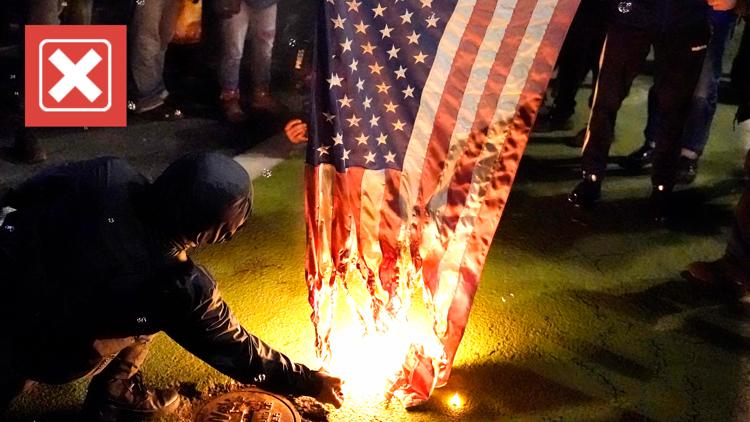The Supreme Court ruled in 1989 that burning the U.S. flag is a form of free speech protected by the First Amendment.


On July 24, Israeli Prime Minister Benjamin Netanyahu gave a speech at a joint congressional meeting, sparking large protests outside the U.S. Capitol. Footage of the protests online show protesters burning the American flag.
The videos have led to discussion online about the ability to burn a U.S. flag, with one user writing, “You should be put in jail if you burn the American flag.” VERIFY reader John reached out to ask if burning the American flag is a crime.
THE QUESTION
Is it illegal to burn the American flag?
THE SOURCES
THE ANSWER
![]()
No, it’s not illegal to burn the American flag.
WHAT WE FOUND
There’s no federal law against burning the American flag, and the Supreme Court previously determined the action to be free speech under the First Amendment.
In 1984, Gregory Lee Johnson was arrested for burning an American flag outside of the Republican National Convention in Dallas, Texas. He was convicted of “desecration of a venerated object in violation of a Texas statute.” Johnson appealed the verdict to the Texas Court of Criminal Appeals, which reversed the original conviction. The Supreme Court upheld the decision in Johnson’s favor because “flag burning constitutes a form of ‘symbolic speech’ that is protected by the First Amendment.”
The First Amendment protects several fundamental rights, including free speech. The Supreme Court determined “freedom of speech protects actions that society may find very offensive, but society's outrage alone is not justification for suppressing free speech,” United States Courts explained.
The Texas law also not only punished actions of free speech, but “respectful actions” such as burning and burying a flag that is no longer in usable condition, U.S. Courts added.
Over the years, Congress has attempted to enact a federal ban on burning the American flag, however, the attempts have either been overturned by the Supreme Court or did not receive enough votes to be passed.
For example, in 1989, Congress passed the Flag Protection Act, however, this was deemed unconstitutional by the Supreme Court the following year, the Constitution Center says.
Some states still have their own laws against burning American flags, however, they “would be overruled in the courts if enforced,” a Freedom Forum article says.
The VERIFY team works to separate fact from fiction so that you can understand what is true and false. Please consider subscribing to our daily newsletter, text alerts and our YouTube channel. You can also follow us on Snapchat, Instagram, Facebook and TikTok. Learn More »
Follow Us
Want something VERIFIED?
Text: 202-410-8808
.png)









 English (US) ·
English (US) ·